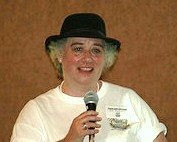
December 15, 2007
In class this past Sunday our fearless instructor asked a leading question.
In class this past Sunday our fearless instructor asked a leading question.
But first, I know he is fearless not only because he stands in front of our persnickety class, but because he has admitted his failings and seems at peace with them. That is courage.
So our fearless leader asked a leading question (drat, no pun intended) ( I don't like puns). It went something like this...If you walk into your kitchen and your Mom is standing at the sink crying, what do you do?
Now this is a very simplistic question that does not take into account any history between mother and child. Yet what happened was very informative and eye-opening for me. My classmate answered along these lines: “Why, I would go up to her and ask what is wrong and see if I could comfort her.”
However, others of us responded more emotionally: “I would leave quickly!”
Now back story left out, that is quite a contrast in responses....reassure or runaway?
I could get meandering along and question whether one response is neurotypical and empathetic while the other response may be more along Aspergian reactions but I wish to go somewhere else with this.
Relationship is hard work, very hard work. And those who are “neurotypical” seem to grasp the intricacies of social context in an easy going manner. But is that true? Witness the huge numbers of divorces, and that doesn't reflect the number of broken relationships between singles or same gender partnerships. Witness the professional categories of lawyers, counselors, psychologists growing well past the proportion economics ordinarily indicate. Witness the statistics for suicide, substance abuse, and school violence.
Wow. Now that you are totally depressed and feel complete revulsion about a possible relationship with me, let's head back to FRIENDSHIP.
Friendship is an ideal. Friends listen. Friends offer support during joyful times and harsh times. Friends respond. Friends accept you as you are. Friends go with you on your journey(s). Friends comfort, encourage, enlighten, amuse, sing, and dance and cry with you.
Such an ideal, ja?
Yet in day-to-day events, no one can be all those verbs and nouns all the time. A person who demands that level of interaction may be considered manipulative, controlling, narcissistic, and the intensity may be diagnosed as unhealthy. A person who offers that level of support may be insecure and co-dependent.
Yet those are the IDEALS of true friendship.
How does anyone TEACH those altruistic and complex ideas? How do persons LEARN to listen, learn to encourage, learn to accept events and people “at face value?” The number of assumptions and presumptions is astronomical...just take one or two of these characteristics, break down the skills and tasks inherent in comfort, for example. Then do the multiplication.
Staggering, absolutely staggering.
So I am amazed at those interventionists and educators who strive day after day, year after to year, to teach some social skill to the neurodiverse. Each 'thread' of intervention, from Applied Behavioral Analysis to Cognitive Behavioral Theories to Sensory Integration ad infinitum, strives to improve the QUALITY OF LIFE for the autism spectrum child (and occasionally even the adult).
I was recently in Long Beach, Cali, (that's what everyone “out there” called California) for a retreat/institute with the Freedom Writers Foundation. For the first time in my life I had a one-on-one for much of my stay and it changed my life. Robyn, Sonia and Zac accompanied me pretty much everywhere, along with my trusty Dachshund mix, Shakespeare Aristotle Redboots.
But Robyn, Sonia and Zac didn't just walk beside me, they embraced me and totally accepted me, made me feel like family, or at least how I would like to think family SHOULD feel, and they made a safe a and happy spot for me so I could learn, and meet other people, and participate in the program.
So for the better part of five days I was completely myself and accepted and enjoyed as myself.
That did more for me in five days than 30 years of struggling, developing coping strategies and accommodations and striving to adapt to everyone about me!
That did more for me in five days than 30 years of struggling, developing coping strategies and accommodations and striving to adapt to everyone about me!
So I have been thinking about skills and tasks and the fact now that autism has been proven to be neurological, a physical and permanent condition. And I put that together with quality of life issues and with the fact that blind and deaf persons are no longer seen as retarded and worth putting in an institution and I come up with the idea that as more Aspergians and “high functioning” auties find one another, that perhaps we shall evolve our own CULTURE, our own language and methods for relating to others, and once again I have hope.
My friends Zac gives me lots of hope. He 'translates' words and events for me and he gives me time to process questions so the answers are mine, not hurried. He watches me and notices when I am uncomfortable then takes steps to improve the situation.
And that is my definition of improving the quality of my life and my relationships. I can pay attention. I can hug someone and maybe even be patient.
One of my favorite quotes is from the brilliant artist and scientist Michaelangelo: “I am still learning.”
So if a great mind can say that with inner peace in his old age, then so can I.
Friendship is hard work. Friendships can be very painful. Real friendships are worth the effort.
I am, indeed, still learning.
What do you do when you see an endangered animal eating an endangered plant?


